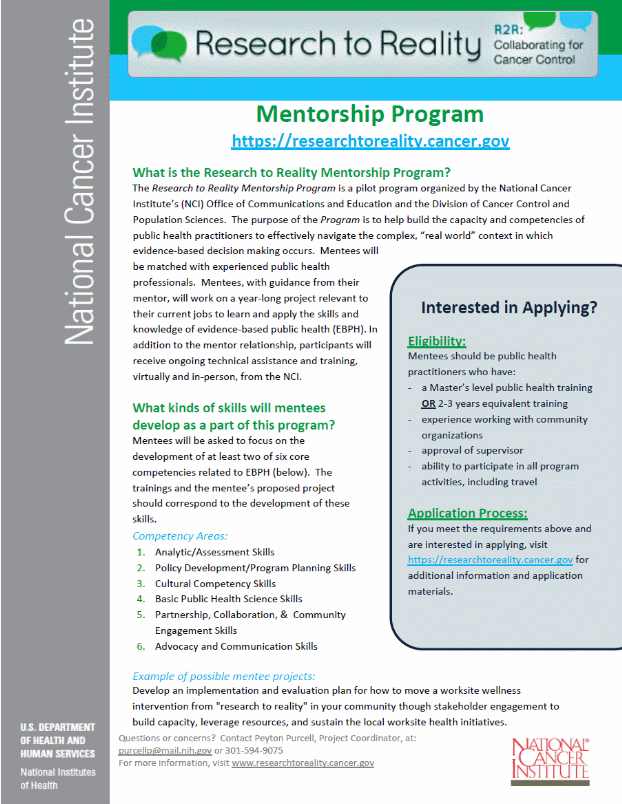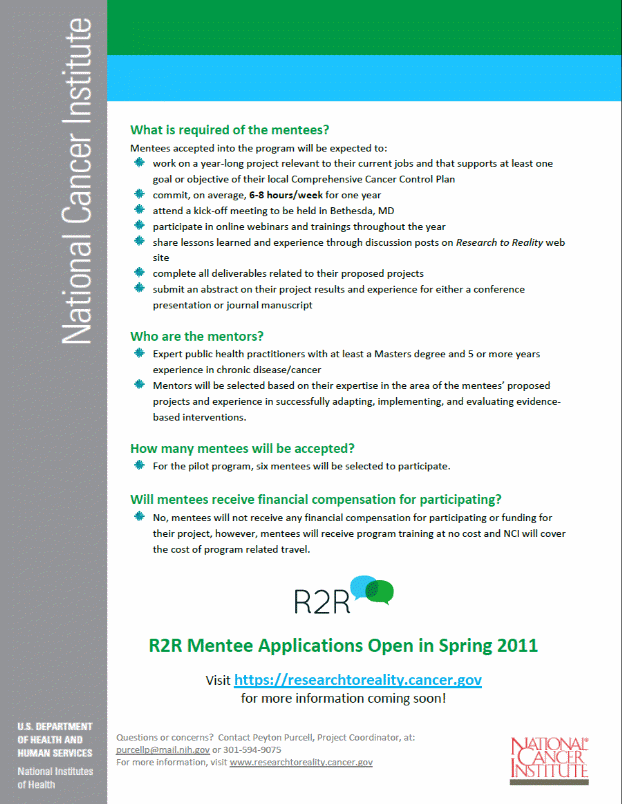#11_OMB_Justif Memo_R2R_FINAL (2)
#11_OMB_Justif Memo_R2R_FINAL (2).docx
Formative Research, Pretesting, and Customer Satisfaction of NCI's Communication and Education Resources (NCI)
#11_OMB_Justif Memo_R2R_FINAL (2)
OMB: 0925-0046

Date: March 11, 2011

To: Office of Management and Budget (OMB)
Through: Seleda Perryman, Report Clearance Officer, HHS
Mikia Currie, Program Analyst, OPERA, NIH
Vivian Horovitch-Kelley, OMB Project Clearance Liaison, OMAA, NCI
From: Michael Sanchez, Public Health Advisor
Division of Cancer Control and Population Sciences (DCCPS), and
Nina Goodman, Project Officer
Office of Communications and Education (OCE)
National Cancer Institute/NIH
Subject: Generic Sub-study, “Research to Reality Mentorship Program Application” under “Formative Research, Pretesting, and Customer Satisfaction of NCI’s Office of Communications and Education,”
OMB No. 0925-0046-11, Expiry Date 02/28/2013
Background, Need and Use of Information
The National Cancer Institute (NCI) proposes soliciting mentee applications for a new pilot program, the Research to Reality Mentorship Program. The Research to Reality Mentorship Program is a collaboration between the Division of Cancer Control and Population Sciences (DCCPS) and the Office of Communications and Education (OCE). NCI proposes using a customized application to gather information from applicants interested in participating in the Research to Reality Mentorship Program regarding their interest, experience, and competencies in evidence-based interventions. The goal of this collaboration and pilot program is to assess the feasibility of a mentorship program for enhancing the skills of individuals of core competencies necessary for identifying, adapting, implementing, and evaluating evidence-based cancer control and prevention interventions in community or clinical settings. The applications are to facilitate the selection process of the mentees who will participate in the pilot. All applications submitted will be reviewed and six mentees will be selected to participate in this pilot.
This application will also help NCI gather feedback regarding characteristics of its applicants that are interested in, and in need of training, around evidence-based interventions. Furthermore, the competency assessment component of the application will be used as a pre- and post-test of the mentee’s competencies and will be compared with the planned post-program assessments to evaluate the effectiveness of the pilot program in improving the competency of the participants. The competency assessment measures included in the application are based on a previously studied competency assessment and survey.1,2 However, no other applications or surveys have been conducted in relation to the Research to Reality Mentorship Program.
The objective of the application is to solicit public health practitioners and cancer control planners across the US to participate in the pilot Mentorship Program. The application will be used to assess applicants’ current public health core competency and the particular skills that they would like to enhance through their participation in the Mentorship Program. From the applications, NCI will select six participants to be matched with a mentor – experienced cancer control researchers or practitioners chosen based on their area of expertise - for this pilot program.
Participants, Research Instrument, Methodology and Burden
To recruit applicants, all Cancer Control P.L.A.N.E.T. listserve subscribers and Research to Reality users will be sent an email announcing the new program and inviting interested applicants to visit a link to the web page where the application will be housed. NCI will also send this email and a flyer to several organizations working in cancer prevention and control. The email and flyer will include information about the Mentorship Program.
The e-mail (Attachment 11A) and flyer (Attachment 11B) will include a link to a Web site Research to Reality (https://researchtoreality.cancer.gov) on which the application and self-reported competency assessment (Attachment 11C), a downloadable electronic document, will be posted. The applicants will be able to download the file, save it to their personal folders, and return to the application at any point in time to complete the questions. Editable fields will be restricted to the answer sections.
Additionally, paper-based applications may be distributed at local conferences and meetings at the Cancer Control P.L.A.N.E.T. and/or NCI exhibit booth. The completed application will be submitted by the applicant via email or mail to the NCI. The audiences of both the Research to Reality webpage and expected conferences and meetings primarily include both public health and community practitioners. As an ongoing reminder, an announcement will be included on the Research to Reality website (https://researchtoreality.cancer.gov) and the Designing for Dissemination web page (http://dccps.cancer.gov/d4d/) during the period the call for applications is open.
In addition to the application and self-reported competency assessment, respondents will be asked to submit a one-page project description, CV/resume, a Mentee-Supervisor Agreement Form (Attachment 11D), as well as contact information.
Areas the application questions will assess include the following:
Applicant’s prior experience with intervention development and implementation and cancer control planning coalitions.
Applicant’s competency level in six core competencies related to identifying, adapting, and implementing evidence-based interventions (i.e., analytical/assessment skills; program planning and policy development skills; cultural competency skills; basic public health science skills; community engagement and partnership skills; and communication and advocacy skills).
How the applicant heard about the Mentorship Program.
The application will be open for approximately 1 month. It is expected that the application questions and the one page description, along with assembling their CV/resume, will take less than 1 hour. Based on anticipated interest, it is estimated that approximately 50 applicants will apply and the total respondent burden is estimated to be less than 51 hours. This effort will account for less than 1 percent of the total burden hours granted in the full generic OMB clearance package. To date, a total of 1758 burden hours have been used of the 7050 hours that were requested.
-
Estimates of Hour Burden
Types of Respondents
Number of Respondents
Frequency of Response
Average Response Time
Annual Hour Burden
Public Health Practitioners/Cancer Control Planners Applicants for Mentor Program
50
1
1 hour
50
Post-Program Competency Assessment of Mentees
6
1
10/60
(0.167)
1
Total
56
1
51
Other Considerations
Participation will be strictly voluntary. Consent to participate in the Mentorship Progam will be implied if the respondents complete and return the application. The email to the respondents explains that consent is implied upon response.
The application will collect personally identifiable information such as names, e-mail addresses, and contact information that is stored and linked to the responses will be kept in a locked file cabinet and file folder only accessible to program staff. However, these individual responses will only be available to program staff at the NCI. Responses to items will not have any effect on the participants’ eligibility for, or receipt of, services outside of the Mentorship Program. All data will be collected by the NCI staff. All information provided by respondents will be kept private under the Privacy Act. The NIH Privacy Act Officer has been contacted to confirm that information collected under this sub-study will be covered by the Privacy Act.
As discussed, data regarding competency self-assessment collected in the applications will be compared to future self-assessment data collected from the six mentee participants following their completion of the pilot. NCI staff will conduct the analysis of the data and write the report of the findings. The report will clearly document that this is a feasibility study and the results cannot be generalized to future programs. If this pilot program is successful, the report will be shared with NCI leadership, other HHS agencies and public health organizations interested in disseminating the mentorship program. Publications may include details pertaining to the development of the program, summary of applicants’ characteristics, where applicants heard about the mentorship program, as well as pre- versus post-program competency changes for the six applicants selected to participate in the pilot. All publications will be reported in the aggregate and no identifiable individual responses will be provided. Representatives from the NCI will review the research protocol and instruments to ensure that all necessary human subject protection procedures are in place.
List of Attachments (attached below)
11A: Email Announcement
11B. Promotional Flyer
11D. Mentee-Supervisor Agreement Form
List of Attachments (attached separately)
11C. Application and Competency Assessment
Attachment 11A: Email Announcement

Call for Applications Opening June 1st, 2011
We invite you to submit an application for the pilot of the Research to Reality Mentorship Program. The purpose of the Program is to help build the capacity of public health practitioners to effectively navigate the complex, “real world” context in which evidence-based decision making occurs by matching experienced public health professionals with community practitioners. The Program will aim to develop practitioner’s knowledge, understanding, and skills around core competencies necessary for identifying, adapting, implementing, and evaluating evidence-based cancer control and prevention interventions in community or clinical settings. The applications will be reviewed by a panel of NCI program staff and six mentees will be selected and matched with a mentor for the pilot which will kick-off in the Fall 2011. The attached flyer has additional information about the details of the program or you can visit https://researchtoreality.cancer.gov for more information.
If you are interested in applying, please download the application form and requirements from the Research to Reality web site (https://researchtoreality.cancer.gov) and send your completed application and materials to [email protected].
11B. Promotional Flyer (2 pgs)


11D. Mentee-Supervisor Agreement Form

Mentee/Supervisor Agreement
Submit with Mentee Application
Mentee Name: Click here to enter text. |
|
Organization/Agency: Click here to enter text. |
|
Supervisor Name: Click here to enter text. |
|
Supervisor Title: Click here to enter text. |
|
Supervisor Phone: Click here to enter text. |
Supervisor Fax: Click here to enter text. |
Supervisor Email: Click here to enter text. |
|
The Research to Reality (R2R) Mentorship Program is a 12-month program, beginning in March 2010. Mentees participating in this peer-to-peer mentorship program will complete a project of their choosing, with the assistance and guidance of their mentor. The project chosen should be relevant to the mentee’s agency and work. In addition, the mentee’s supervisor should be included in the process of deciding on a project for the mentee to complete.
Participation in the program requires the following:
R2R mentees will have their agency’s approval to participate.
R2R mentees and their supervisors agree to goals and objectives of the program.
R2R mentees will honor the time commitments (approximately 6-8 hours/week) of this program (including the kick-off event, trainings and webinars, mentee/mentor meetings, quarterly conference calls, working on project).
R2R participants and their supervisors will agree to participate in the periodic evaluation components of this program (e.g., evaluation forms, exit interviews).

Signatures:
I agree to meet the requirements above.
Mentee __________________________________________Date_____________________
I support the above mentee’s application to participate in the R2R Mentorship Program and agree to meet the actions required of the mentee supervisor, if the applicant is accepted into the program.
Mentee’s Supervisor________________________________Date_____________________
1 Edgar M, Mayer JP, and Scharff DP. Construct Validity of the Core Competencies for Public Health Professionals. J Public Health Management Practice, 2009, 15(4), E7–E16
2 National Association of Chronic Disease Directors. Competency Assessment Tool. http://www.chronicdisease.org/professional-development/documents/workforce-dev/CompetenciesAssessmentTool.pdf. Accessed 9/2/2010.
| File Type | application/vnd.openxmlformats-officedocument.wordprocessingml.document |
| File Title | DEPARTMENT OF HEALTH & HUMAN SERVICES |
| Author | krs0 |
| File Modified | 0000-00-00 |
| File Created | 2021-02-02 |
© 2026 OMB.report | Privacy Policy